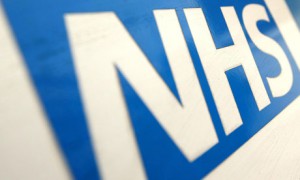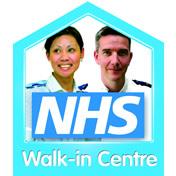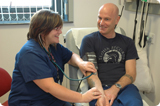NHS Manchester has less than a year to live
Article published: Thursday, May 31st 2012
Walk-in centres in Ancoats and Wythenshawe are due to close within months, as the council committee responsible for managing the transition from the current health service to the coalition government’s vision of ‘joined-up’ provision, held its first public meeting last week.
 Following the passage of the Health and Social Care Act 2012 into law on 27 March this year, NHS Greater Manchester will cease to exist as of April 2013, and will be replaced by three Clinical Commissioning Groups (CCGs), one each for the central, north and south sections of the Greater Manchester region.
Following the passage of the Health and Social Care Act 2012 into law on 27 March this year, NHS Greater Manchester will cease to exist as of April 2013, and will be replaced by three Clinical Commissioning Groups (CCGs), one each for the central, north and south sections of the Greater Manchester region.
In technical terms, NHS Greater Manchester is a cluster Primary Care Trust (PCT), which organises another ten smaller PCTs across the Greater Manchester Area. Over the next year CCGs will replace every PCT in the country, subject to an authorisation process.
One of the most important changes made to healthcare during the switchover from NHS Primary Care Trusts to Clinical Commissioning Groups is in their provision for urgent care – that is, getting help from a medical professional on the same day you ask for it, usually for a minor illness, injury or emergency contraception, unlike immediately life-threatening injuries which are handled by A&E.
Closures
A key provider of this care in North Manchester is Ancoats Minor Injuries Unit walk-in centre, which has been identified for closure by the North Manchester CCG despite the number of people using the facility increasing last year.
which has been identified for closure by the North Manchester CCG despite the number of people using the facility increasing last year.
A request under the Freedom of Information Act 2000 by Councillor Neil Swannick, of Manchester City Council’s Health Scrutiny Committee, found that approximately 18,000 people used the Ancoats walk-in centre in the last couple of years, with an increase of around 5 per cent in 2011.
Councillor Swannick commented: “An update to our last meeting showed that the figures for the last year showed a 5 per cent increase whilst health officials were trying to convince the [Health Scrutiny] Committee that their extension of the provision of same-day GP access was providing an adequate alternative.”
North Manchester CCG undertook a three week ‘Mystery Shopper’ exercise during late April and early May 2012, in an attempt to prove its improved provision for urgent care. In their report to the council they said: “Whilst many of our practices performed very well, several did not handle these calls consistently and a small minority of practices were unable to offer same-day access in most cases. Out of a total of 225 calls, 59.5 per cent of calls (139) resulted (or would have resulted) in a same-day clincal assessment.”
Councillor Swannick responded: “Health officials asked us to accept the results of a “mystery shopper” exercise as evidence of alternative provision. Even that showed, as I said at the meeting, that 40% of people in the exercise in North Manchester were told they could not have same day access to their GP.”
Ancoats walk-in centre was originally opened as a compromise, following a campaign against the closure of Ancoats Hospital in 1987, which had previously met the needs of the densely-populated area. Now the walk-in centre itself faces closure as North Manchester CCG intends to integrate the walk-in centre’s services into the A&E department at North Manchester General Hospital, about three and a half miles away, by the end of June.
Transport Problems
Councillor Swannick also highlighted the potential transport problems getting from Ancoats to North Manchester General Hospital, pointing out the 20-30 minute car journey from Ancoats, depending on traffic, and that the area of East Manchester area previously covered by Ancoats WIC has a relatively low rate of car ownership, meaning many local residents rely on public transport. This creates additional difficulties for the elderly and people with long-term physical or mental disabilities.
Doctor Martin Whiting, Urgent Care Lead GP for North Manchester Clinical Commissioning Group said that uncertainty over the centre’s future was causing difficulty for staff at Ancoats WIC. He added: “This isn’t about closing walk-in centres; this is about improving the quality of our clinical services.”
Another urgent care service provider to be closed is the Wythenshawe Forum walk-in centre, with its resources transferred to the Emergency Department at Wythenshawe Hospital, one and a half miles away, by the end of August 2012.
Doctor Whiting’s counterpart at South Manchester CCG, Doctor Peter Fink, echoed his colleague’s comments, saying that the situation at Wythenshawe Forum WIC was, “extremely difficult, with staff having a lot of trouble dealing with the uncertainty of the situation.”
Health and Wellbeing Boards
The new CCGs will be co-ordinated nationwide by the independent NHS Commissioning Board, and at a local level, by Health and Wellbeing Boards (HWBs), which are effectively a form of council committee, except their membership is made up largely of medical professionals, or representatives of private or voluntary organisations, rather than elected councillors.
Health and Wellbeing Boards have not yet been legislated for by the Government, so Manchester City Council has set up a ‘Shadow Board’, comprising the individuals who will be its members once it comes into law. It was the first public meeting of this committee on May 23 this year, though they’ve been meeting in private since September 2011. It was chaired by the Leader of Manchester City Council, Councillor Richard Leese.
Sue Wallis, from NHS Greater Manchester, delivered a report entitled ‘Safe and Sustainable’ on the transfer of healthcare to CCGs to the Board, and described a discussion with the public, due to begin in July 2012, about the form it will take. She said: “The public discussion will be at a very local level, and will run from July onwards, when there will be much more publicity for what we’re doing at the moment; we don’t have the website up yet for example.”
Wallis went on to say that the public discussion will take place “mostly through existing council mechanisms” but that additional events may also take place if necessary.
Both Ancoats and Wythenshawe walk-in centre closures have been repeatedly opposed by the council’s Heath Scrutiny committee, whose remit is to examine and evaluate how health and social care is provided in Manchester. This committee previously wrote to the Minister for Health, Andrew Lansley, with its concerns. Lansley approved the closures of the walk-in centres, on the proviso the committee was convinced adequate alternative provision existed.
“Not enough evidence”
At the most recent committee meeting, on the day after the meeting of the Health and Wellbeing Board, the Chair, Councillor Eddy Newman, tabled a resolution, passed unanimously, which placed it at odds with the Urgent Care lead GPs of the three forthcoming CCGs.
The resolution expressed disappointment that sufficient evidence had not yet been provided that same day access to a health professional at patients’ GP surgeries is in place.
It went on to say, “[The committee] notes that no evidence has been provided to indicate that there has been a reduction in demand for the Ancoats and Wythenshawe Forum walk-in centres [and] consequently rejects the proposals to close the Ancoats and Wythenshawe Forum walk-in centres in respect of late June and August this year.”
The resolution called for postponement of the closures, and warned that should the CCGs refuse, the committee will again write to the Minister for Health to inform him that NHS Manchester and the three CCGs are “taking precipitous action contrary to his decision and asking him to intervene.”
CCGs have previously been criticised as having potential for corruption by the False Economy research group, who, out of a study of 50 CCGs, found that 22 had “a substantial financial interest in a private company or other non-NHS provider.” This could pose the risk of GPs who have been put in charge of a health budget effectively hiring themselves, for financial gain.
Tom Hegarty
Following publication, a reader pointed out a mistake in the distance between Wythenshawe Hospital and Forum reported in this article. This error has since been amended. MULE thanks all readers for their vigilance and assistance.
More: Council, Cuts, Manchester, News
Comments
-
Very much agree with article, but some facts are wrong. Email me to discuss xxx
Comment by Siobhan on May 31, 2012 at 9:25 pm -
Re: “Another urgent care service provider to be closed is the Wythenshawe Forum walk-in centre, with its resources transferred to the Emergency Department at Wythenshawe Hospital, ten miles away, by the end of August 2012.”
It’s not ten miles away, it’s about one and a half miles away. I knew it wasn’t as far as the former so tried to check out the correct distance online, but Google maps’ first effort if you enter Wythenshawe Forum to Wythenshawe Hospital is incorrect.
From Forum Centre, Forum Square, Wythenshawe, Manchester M22 5RX to Wythenshawe Hospital Southmoor Road, Wythenshawe, Manchester M23 9LT results in 1.6 miles.
Comment by Lulu on June 1, 2012 at 4:53 am -
“a substantial financial interest in a private company or other non-NHS provider.”
There’s nothing inherently wrong with private provision in the NHS, despite what scaremongering self-interest groups like the trade unions would have us believe.
Already, most medical care in the NHS is done by private providers. We know them as GPs or family doctors, and they are not employed directly by the NHS but are private contractors to it.
Comment by pete on June 2, 2012 at 3:20 pm -
‘Doctor Whiting’s counterpart at South Manchester CCG, Doctor Peter Fink, echoed his colleague’s comments, saying that the situation at Wythenshawe Forum WIC was, “extremely difficult, with staff having a lot of trouble dealing with the uncertainty of the situation.”’
This is a classic example of NHS staff making the mistake that the NHS is run primarily for their benefit rather than for the patients.
Factories, shop, offices and other places of employment are always shutting down or relocating, sometimes to India or Poland, never mind 1.5 miles away.
Staff at these places just get on with their jobs until the place closes.
There’s no reason for staff at the Wythenshawe facility not to work properly until it closes, and they shouldn’t think it should stay open just because they don’t like change at work.
Dr Fink seemt to be suggesting that NHS places of work should never close simply so that the staff can be spared the uncertainties about employment many millions of us face all the time.
He obviously has no idea how the real world works, the world of the taxpayers who pay every last penny of the NHS’s funding.
Comment by pete on June 2, 2012 at 3:33 pm
The comments are closed.




